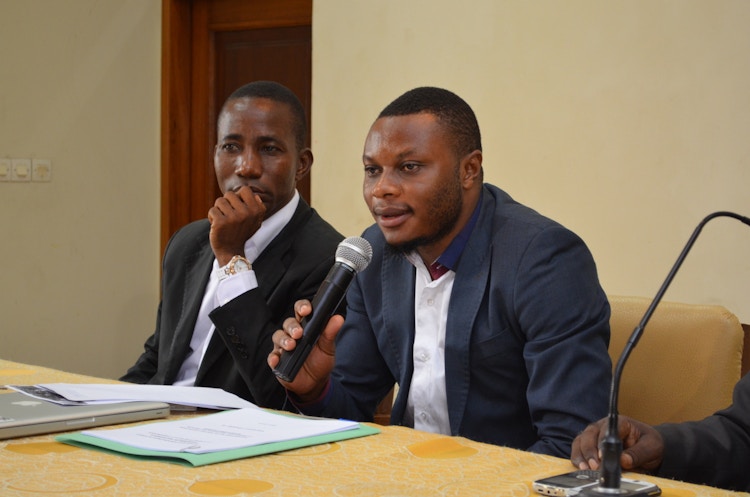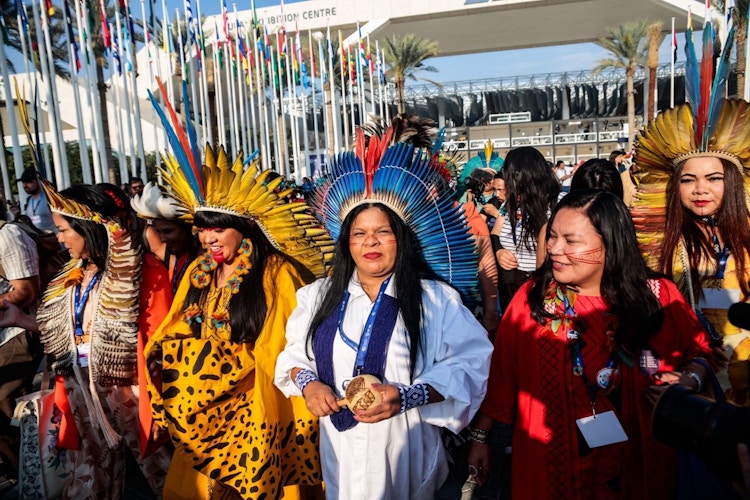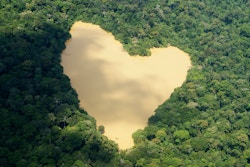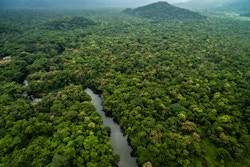
How we create political change
To save the rainforest and solve the nature and climate crises, we must address the underlying causes of rainforest destruction. With our network of partners, we advocate for governments to raise their ambitions and ensure they cut their ties to rainforest destruction and do their part in protecting it.
DEMONSTRATION: Indigenous representatives and Rainforest Foundation Norway employees demonstrate in Oslo in 2017. Photo: Ronny Hansen/Rainforest Foundation Norway
By Rainforest Foundation Norway.
The opportunities for sustainable rainforest management have never been more prominent.
Every rainforest country has committed to halting deforestation and forest degradation by 2030, backed by substantial international financial pledges. Indigenous organizations and civil society groups are increasingly taking the lead in rainforest protection. Companies and investors are also beginning to divest from deforestation-related activities.
Despite these positive developments, deforestation rates remain alarmingly high in many countries. Protecting rainforests is crucial to achieving the ambitious goals set forth in the Paris Agreement, the Convention on Biological Diversity, and the Sustainable Development Goals.
To achieve an effective implementation of these global frameworks, Rainforest Foundation Norway targets decision makers nationally, regionally and internationally, working closely with allies in civil society and among implementing agencies.

ADVOCACY: Patrick Hemedi Saïdi from Rainforest Norway's Congolese partner organization DGPA advocating for the passage of an Indigenous rights law in The Democratic Republic of the Congo in 2014. Photo: DGPA
Driving policy changes and increased funding
Our advocacy work aims to drive necessary policy changes. Through our network of rainforest partners, we strategically advocate for the protection of forests, biodiversity, and human rights to be prioritized in laws, policies, and practices on every level.
A significant achievement of our advocacy efforts is the Norwegian government's commitment to provide up to USD 500 million annually for rainforest protection. This initiative, proposed by Rainforest Foundation Norway and Friends of the Earth Norway in 2007, aims to combat climate change. We are actively advocating for increased forest funding from both Norway and other wealthy nations to maximize positive impact.

COP28: Indigenous Brazilians at COP28 in 2023. Photo: Midia Ninja
Advocating for Indigenous and local solutions
Rainforest countries need more international support to achieve their ambitious deforestation goals. While there has been increased global commitment and funding, it is still insufficient and often poorly distributed. A 2021 report by Rainforest Foundation Norway found that less than 1% of international climate aid supports Indigenous peoples and local communities in their efforts to protect and manage their forests.
Despite growing momentum, a lack of understanding about practical solutions hinders progress. Decision-makers, donors, and the financial sector often lack knowledge of Indigenous-led forest management strategies and tools.
Rainforest Foundation Norway aims to bridge this knowledge gap. We work to develop and share information about effective solutions based on Indigenous peoples' and local communities' own approaches. This information is presented in a clear and actionable way.

ADVOCACY: Julia Naime, Senior Adviser at Rainforest Foundation Norway, at the UN climate summit COP28 in 2023. Photo: Rainforest Foundation Norway
How we work to influence policy
We engage with decision-makers at international levels. We participate in discussions related to rainforests and Indigenous rights at the UN climate summits, the UN biodiversity summits and other relevant high-level arenas. We collaborate with partner organizations to advocate for policies that support rainforest protection and respect Indigenous rights.
We prioritize influencing climate change mitigation measures like REDD+. Our goal is to ensure that these measures promote full participation of civil society, benefit those who protect the forests, and safeguard biodiversity.
In Norway, we work closely with government agencies. We engage with the Ministry of Climate and Environment on the International Climate and Forest Initiative (NICFI) and with the Ministry of Finance and the central bank on the Government Pension Fund Global (GPFG) to minimize its contribution to tropical deforestation.

SUPPORT: In DR Congo, we support our partner organizations in their effort to strengthen the rights of Indigenous peoples. Photo: Florent de La Tullaye
Advocacy in rainforest countries
We cooperate with our partner organizations in engaging in advocacy work in rainforest countries. This work is informed by local experiences, views and conditions, and the expert knowledge of local organizations - while we contribute with our experience from policy, campaigning and communications efforts as well as with financial support.
Together we can exert an influence on the authorities and provide valuable input when it comes to how they should improve practices and policies that affect rainforest ecosystems and the rights of forest-dependent peoples, including Indigenous peoples. For example, we cooperate in crafting submissions to the UN Human Rights Council, which evaluates national compliance with human rights obligations. If the council recommends that a country do more to uphold the rights of Indigenous peoples, this will increase the pressure on the country to do so.

CAMPAIGN: Rainforest Foundation Norway successfully campaigned against the use of palm oil in Norwegian food products in 2012. Norwegian food producers rapidly cut their use of palm oil by two thirds. Photo illustration: Rainforest Foundation Norway
Campaigning and informational activities
We have kept rainforest protection high on the public agenda in Norway by maintaining a clear media profile, sharing information and campaigning, and thus promoting awareness among the Norwegian population and business community of the impacts of their consumption pattern, activities and investments on the rainforest and its inhabitants.
We also engage in close dialogue with businesses that import goods linked to tropical deforestation, such as palm oil and tropical timber, in order that they adopt policies to minimize their footprint on the rainforest.



